Most businesses are ignoring WhatsApp. That’s a mistake.
In 2024, WhatsApp isn’t just for chatting with friends. It’s one of the most powerful marketing tools out there. With over 2 billion users, it’s where your customers are spending most of their time. Yet, many brands overlook it in favor of email and social media.
With over 2 billion users worldwide, WhatsApp boasts a massive open rate of 98%. Compared to the 20% average open rate of emails, this signifies that outreach marketing campaigns on WhatsApp are more likely to engage end-users.
This guide will show you how to use WhatsApp to connect with your audience, grow your business, and stand out from the competition.
Whether you're new to WhatsApp or looking to improve your strategy, this is your roadmap to success in 2024. Let’s get straight in.
What is WhatsApp Marketing?
WhatsApp marketing is the use of WhatsApp to promote products or services, communicate with customers, provide excellent support, and build relationships with potential leads.
It’s all about leveraging WhatsApp’s huge user base to reach your audience where they feel most comfortable – chatting with friends and family on their phones. But instead of cold emails or impersonal ads, marketing on WhatsApp is about having a direct and personal conversation with your audience.
Imagine you are a small business selling handmade jewelry. You’ve already set up your store on social media and have a website. But there’s one problem – most of your customers are lost in the tedious process of purchasing products from your website.
So, you set up a WhatsApp Business account where customers can inquire about products, place orders, and even ask for custom designs. You can send pictures, videos, and even voice messages directly to their inbox, providing a seamless and personal shopping experience.
This is the essence of WhatsApp business marketing - making the customer feel like they’re having a one-on-one conversation where they are being heard and not being spammed by ads.
Businesses can also use WhatsApp marketing to send bulk updates like promotions, sales, or special offers. With tools like WhatsApp Business API, you can even automate some of these messages, ensuring your customers get the correct information at the right time.
Benefits of Using WhatsApp for Marketing
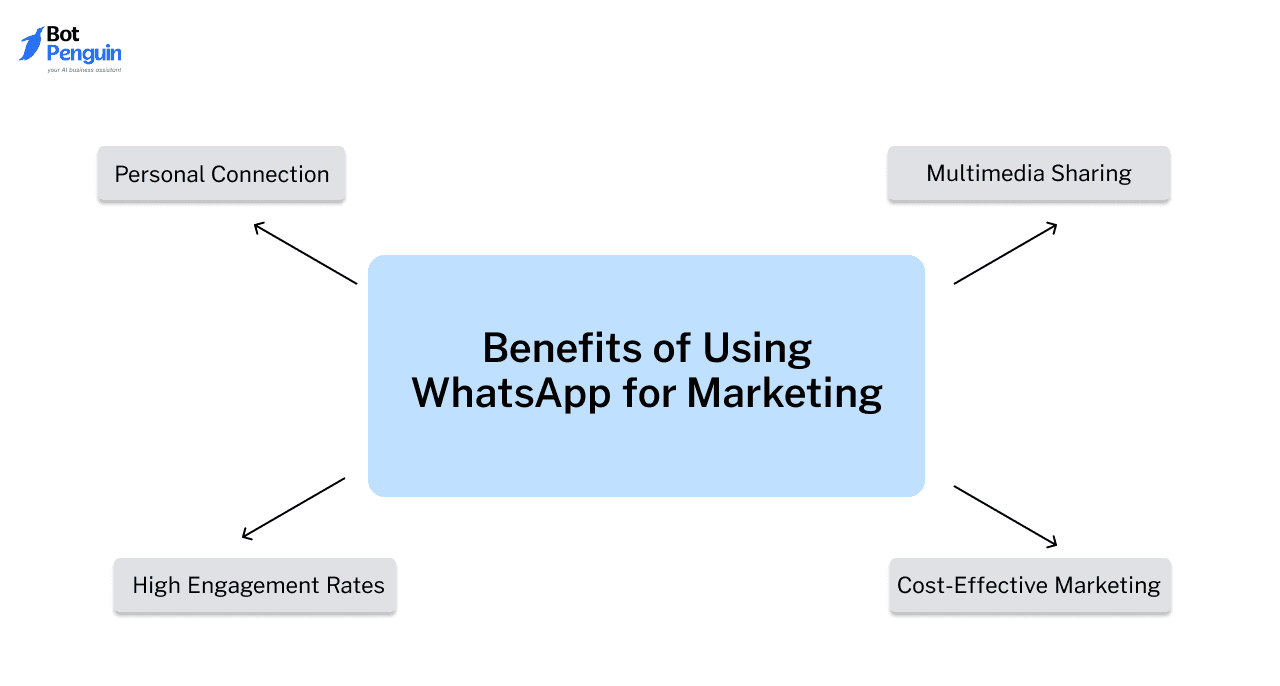
There are numerous advantages to using WhatsApp for marketing, and they go far beyond just sending messages. Let’s dive into why businesses should embrace WhatsApp for marketing.
Personal Connection
One of the biggest benefits of WhatsApp marketing is the personal connection it creates. Unlike emails or social media posts, messages on WhatsApp feel more direct and intimate. It’s the platform where people are already chatting with their friends and family, so receiving a message from a brand feels much more personal.
- For instance, a local bakery might use WhatsApp to send customers reminders about an upcoming order or offer personalized recommendations based on their previous purchases. This personal touch increases engagement and builds loyalty.
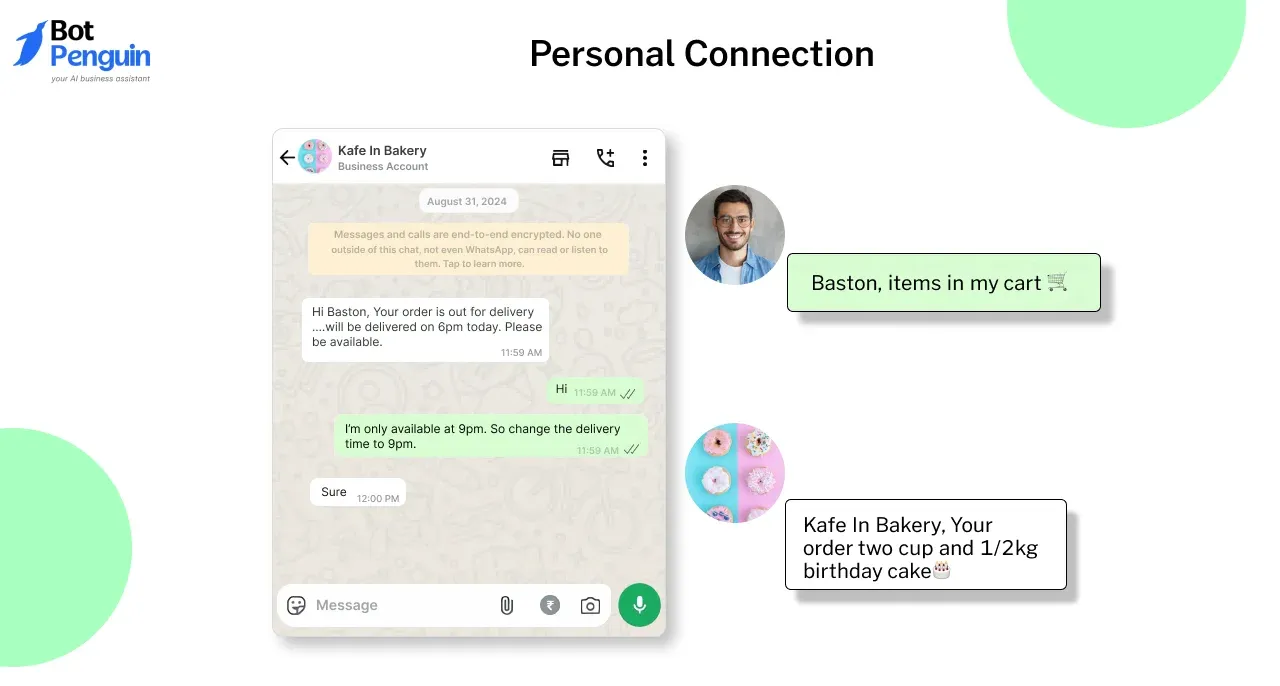
High Engagement Rates
The engagement rate on WhatsApp for marketing is far higher than most other platforms. WhatsApp boasts an open rate of 98%, which is much higher than email, which averages only 20%. This means messages sent on WhatsApp are more likely to be seen and acted upon.
- Imagine you run an online clothing store and have just launched a new line of products. By sending a simple message with photos and a special offer, you’re almost guaranteed that your customers will view it and potentially make a purchase.
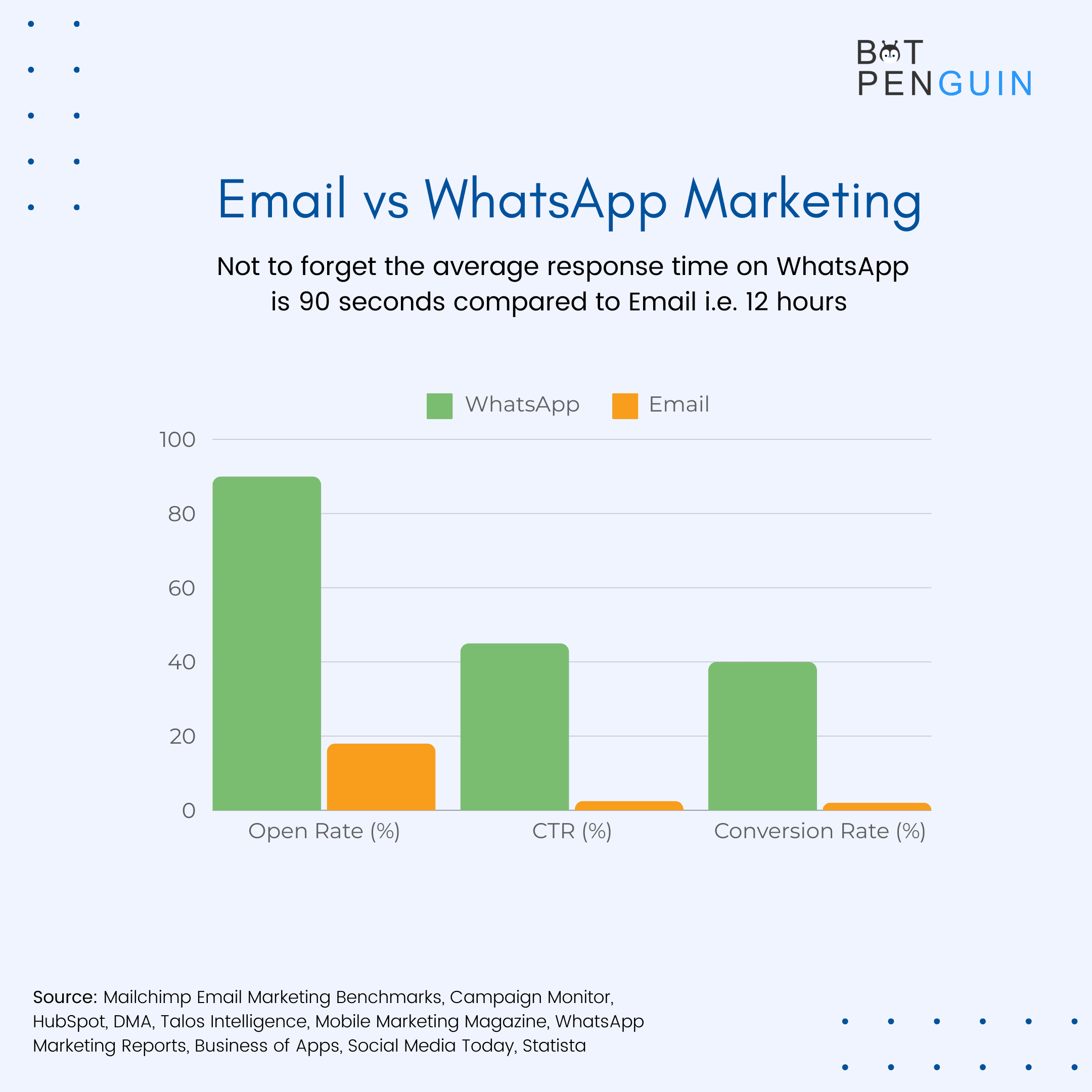
Quick Responses and Customer Support
WhatsApp business marketing also works great for providing quick customer support since 53% of people say they are more likely to shop with a business they can message directly. Multiple companies use it to provide 24/7 support or automate responses to common questions, saving time while keeping customers satisfied.
- For example, a fitness center might use WhatsApp for marketing to answer inquiries about class schedules or membership plans, offering a quick and seamless customer service experience.
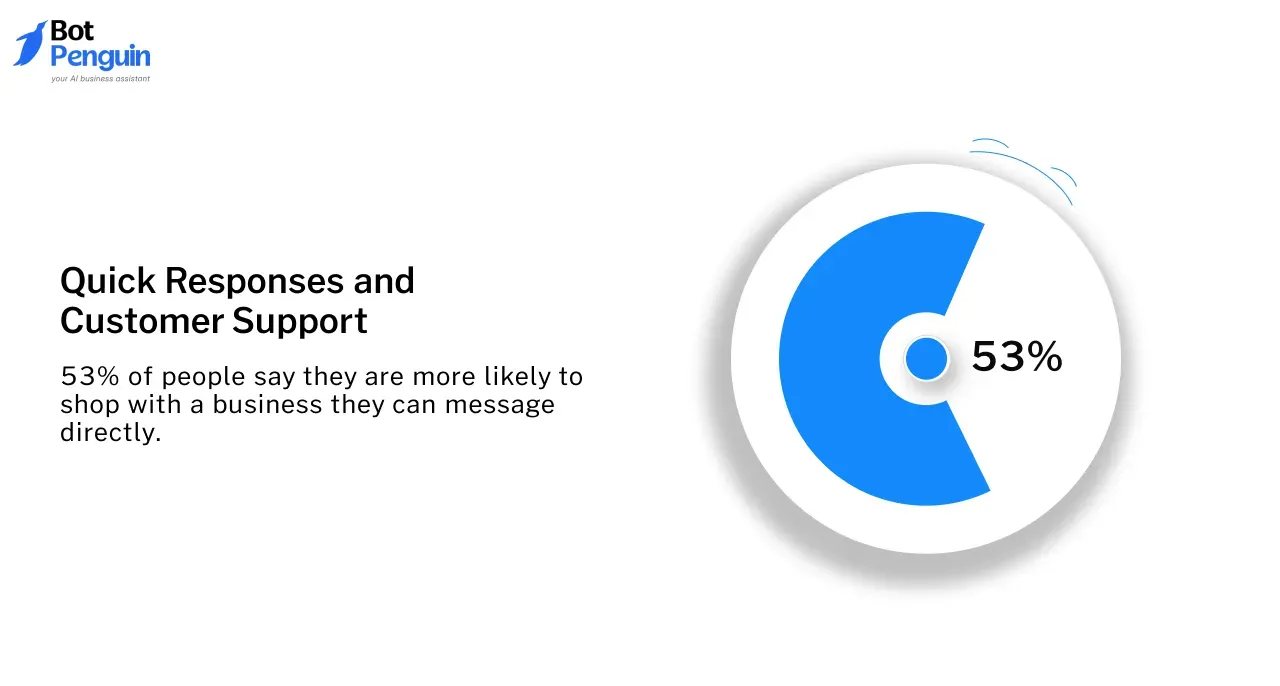
Cost-Effective Marketing
WhatsApp marketing is incredibly cost-effective compared to traditional methods like SMS marketing or printed ads.
Once you’ve set up your WhatsApp Business account, sending messages is free (apart from internet costs). Whether you’re running a small business or a large corporation, using WhatsApp for marketing is an affordable way to reach your audience without spending on costly ad campaigns.
Multimedia Sharing
Unlike traditional marketing channels, WhatsApp marketing allows businesses to send multimedia content like photos, videos, and documents without concern about getting reported. This is great for showcasing products, explaining services, or even sharing testimonials. Many brands even enhance their visuals by using an AI video generator to create high-quality clips before sharing them on WhatsApp, making their campaigns more engaging and professional.
- For example, a local restaurant can send a menu or a video of the chefs preparing a popular dish. This makes WhatsApp business marketing much more engaging and visually appealing than simple text-based platforms.
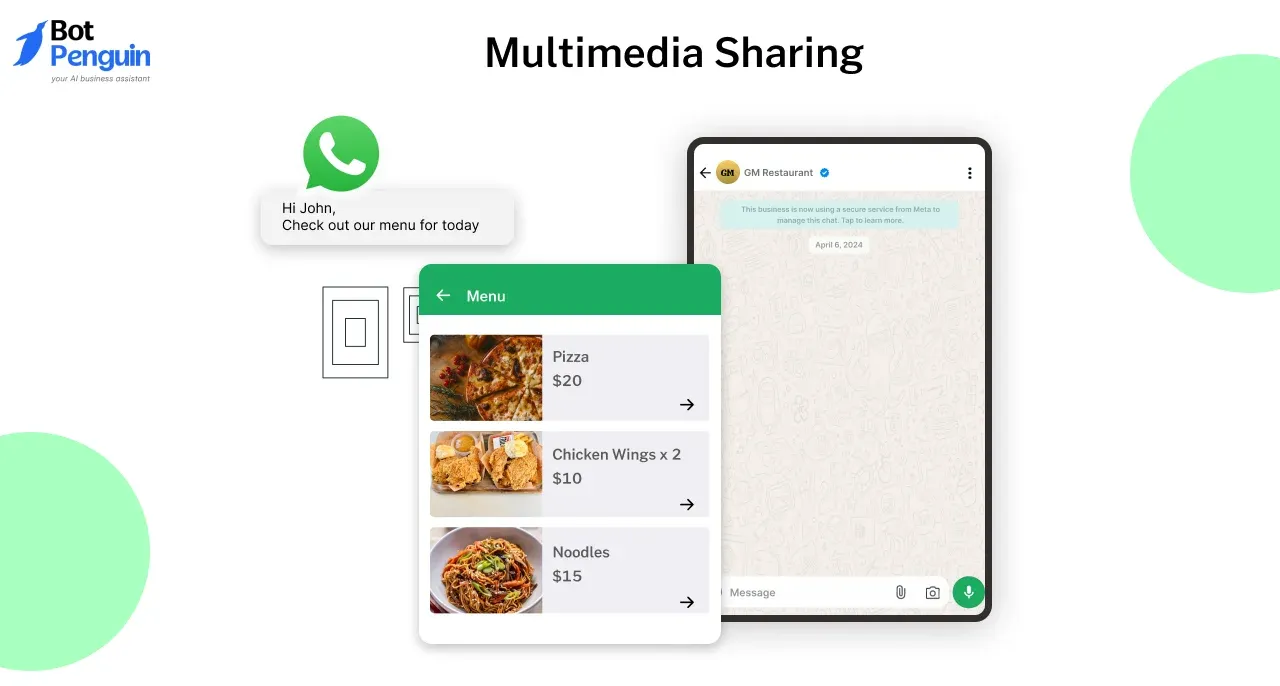
With high engagement rates, quick responses, multimedia sharing, and seamless customer support, WhatsApp is a tool that goes beyond messaging to drive actual results. Embracing WhatsApp for marketing can transform how businesses interact with customers, build loyalty, and increase sales.
Let’s explore how to execute WhatsApp marketing strategy to produce desirable results.
Download our FREE Ebook on WhatsApp Marketing
How to do WhatsApp Marketing
When starting with WhatsApp marketing, you have two primary tools: the WhatsApp Business app and the WhatsApp Business API. Both help businesses connect with customers but cater to different needs.
Whether you’re a small local shop or a large enterprise, understanding how to use these tools will boost your WhatsApp marketing efforts. Let's examine both in detail.
WhatsApp Business App
The WhatsApp Business app is ideal for small businesses. It’s free and easy to use. The app offers features like automated messages, product catalogs, and labels to organize contacts, making WhatsApp business marketing simple and effective for small teams.
- For example, a local bakery could use it to share daily specials, answer customer inquiries, handle table bookings, and send updates about orders.
WhatsApp Business API
The WhatsApp Business API is designed for larger businesses that need to handle high volumes of messages. Unlike the app, the API allows for more customization and integration with other tools like CRMs.
- For instance, a global e-commerce brand can automate order confirmations, send delivery updates, and provide real-time customer support. The API is a must if you’re scaling using WhatsApp for marketing at a large level.
Note: The WhatsApp Business API allows larger businesses to automate messaging and integrate with CRMs. Business Solution Providers (BSPs) are third-party companies that help businesses access and use the API efficiently.
How to do WhatsApp Marketing Using BotPenguin?
When it comes to WhatsApp marketing, businesses need tools that simplify the process. BotPenguin, an official Meta Business partner, is a no-code AI WhatsApp chatbot platform powered by the official WhatsApp Business API. It allows you to automate messaging, integrate with CRMs, and even leverage ChatGPT for smart responses.
BotPenguin is designed to make WhatsApp business marketing easy and efficient for businesses of all sizes. Here's how you can use BotPenguin to get started with marketing on WhatsApp for free at every stage of your funnel.
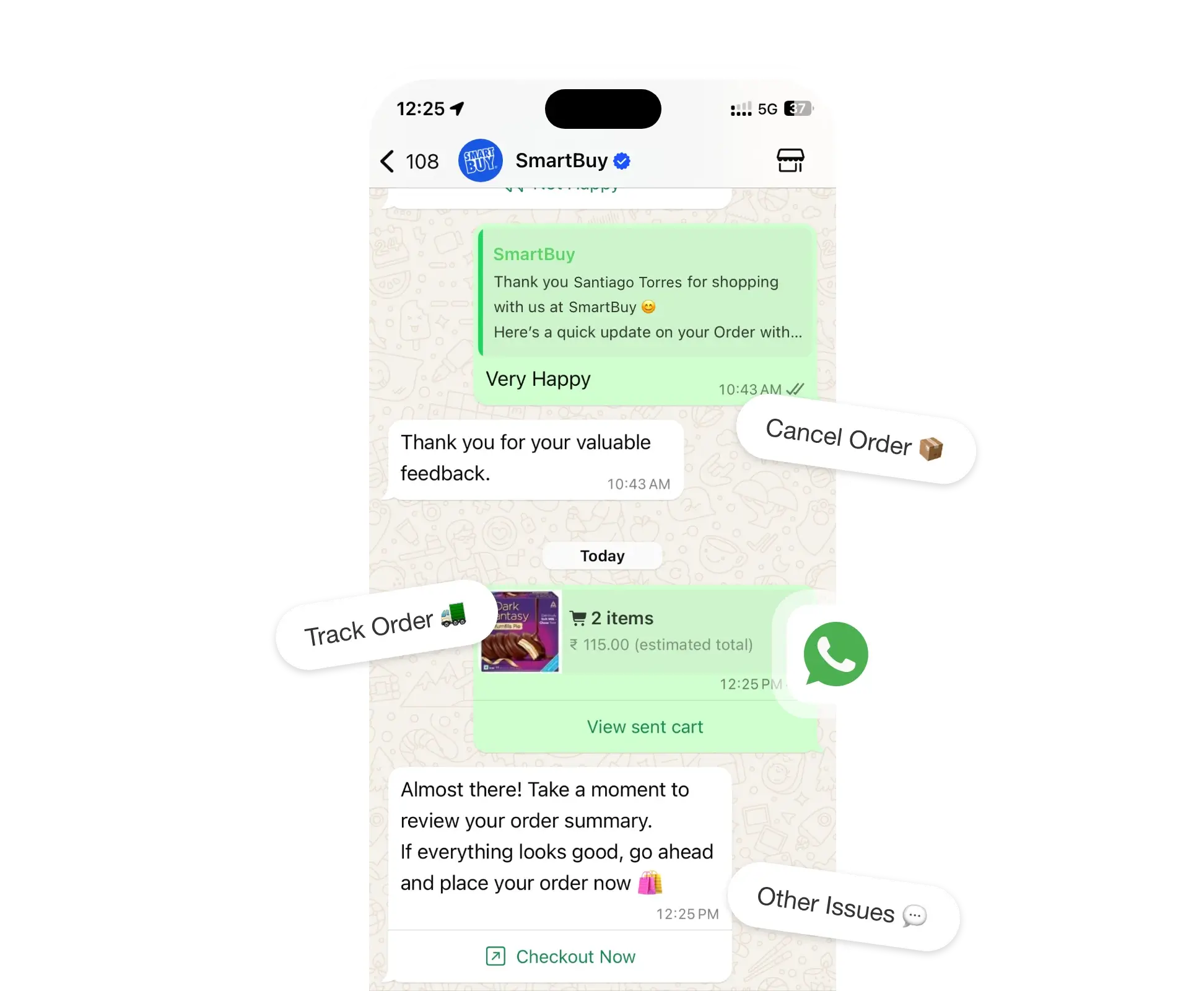
1. TOFU Stage (Top of the Funnel): Growing Your WhatsApp Contact List
The first stage of any marketing funnel is generating awareness, and your goal is to build your WhatsApp contact list. BotPenguin can help you acquire clients by integrating various touchpoints, making it easy for customers to connect with you.
- Click-to-WhatsApp Ads: With WhatsApp marketing, you can run ads on Facebook or Instagram that link directly to your WhatsApp chat. Imagine you're an online fashion retailer. A customer clicks on your ad and is immediately redirected to WhatsApp, where BotPenguin's chatbot welcomes them, answers questions, and offers discounts.
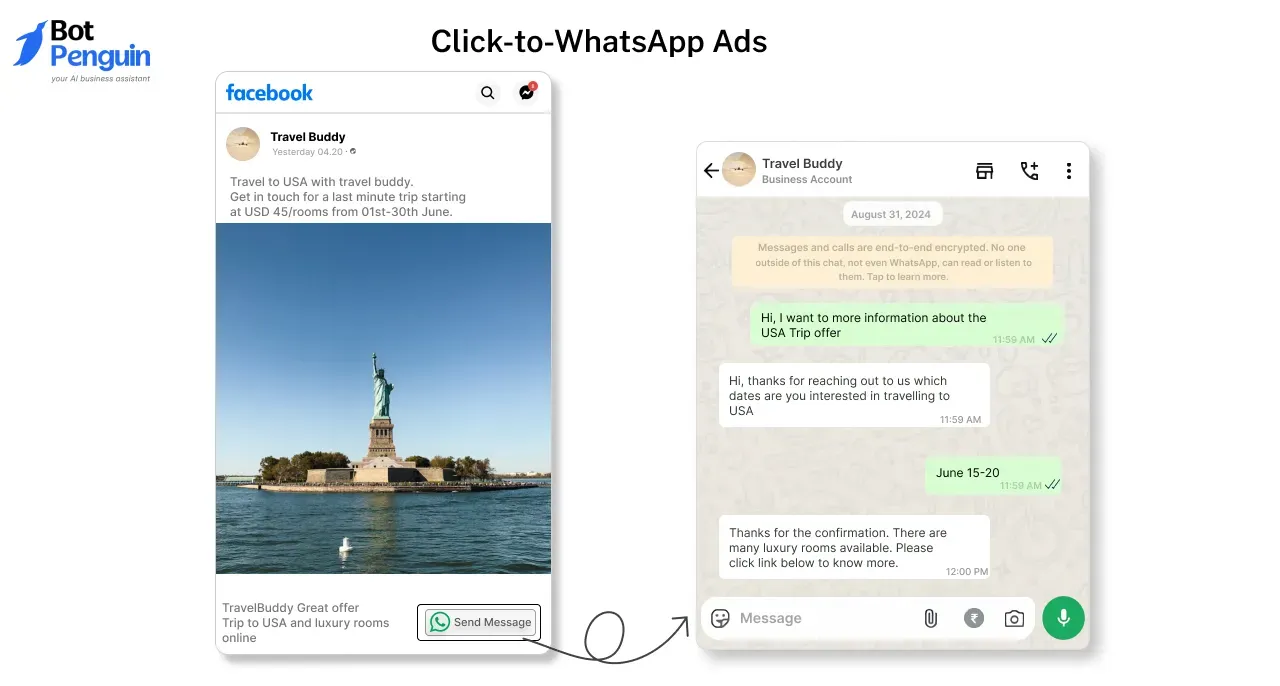
- Website Chatbot: BotPenguin allows you to add a Whatsapp chatbot to your website that visitors can use to engage with your business. For example, a customer on an e-commerce site might ask about product availability. The chatbot provides instant answers and encourages them to opt-in for WhatsApp business marketing updates.
- QR Codes: Displaying QR codes in physical stores or on your website is another way to grow your WhatsApp contact list. A restaurant could place a QR code on its menu, allowing customers to scan and receive exclusive offers through WhatsApp.
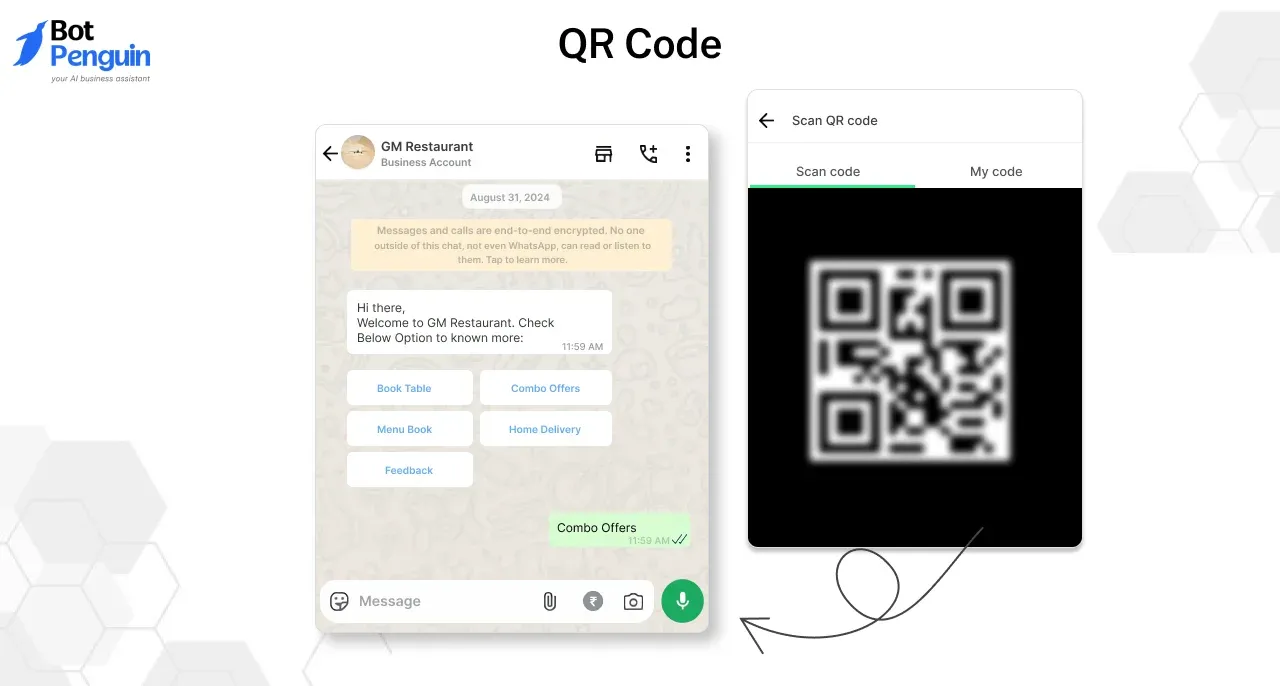
- WhatsApp Link: You can also promote a WhatsApp link on social media, email newsletters, or even receipts. For example, an electronics store could send customers a WhatsApp link after purchase to opt-in for future promotions.
- Opt-In During Checkout: If you run an online store, BotPenguin lets you offer customers the option to opt-in for WhatsApp marketing during checkout. A real-world scenario would be a Shopify store encouraging users to receive order updates and special discounts through WhatsApp, ensuring they stay connected.
This way, you can grow a highly engaged contact list that opens the door to the next stage of the funnel and ensures maximum conversions.
Check out our FREE WhatsApp Link Generator
2. MOFU Stage (Middle of the Funnel): Sending Effective Promotional WhatsApp Messages
Once you've built your contact list, the next step is to nurture those leads. This is where BotPenguin's segmentation and broadcasting features come in handy.
- Segmented Broadcasts: BotPenguin allows you to send targeted messages based on customer behavior, purchase history, or preferences. For instance, an online bookstore can send personalized promotions on mystery novels to customers who have shown interest in that genre. This makes your WhatsApp business marketing highly relevant and engaging.
- Retargeting: Retargeting is crucial for re-engaging potential customers. If someone added items to their cart but didn't complete the purchase, BotPenguin can send automated cart abandonment messages. For example, a customer might receive a WhatsApp message saying, “Hey, you left a few items in your cart. Complete your purchase now for a 10% discount!”
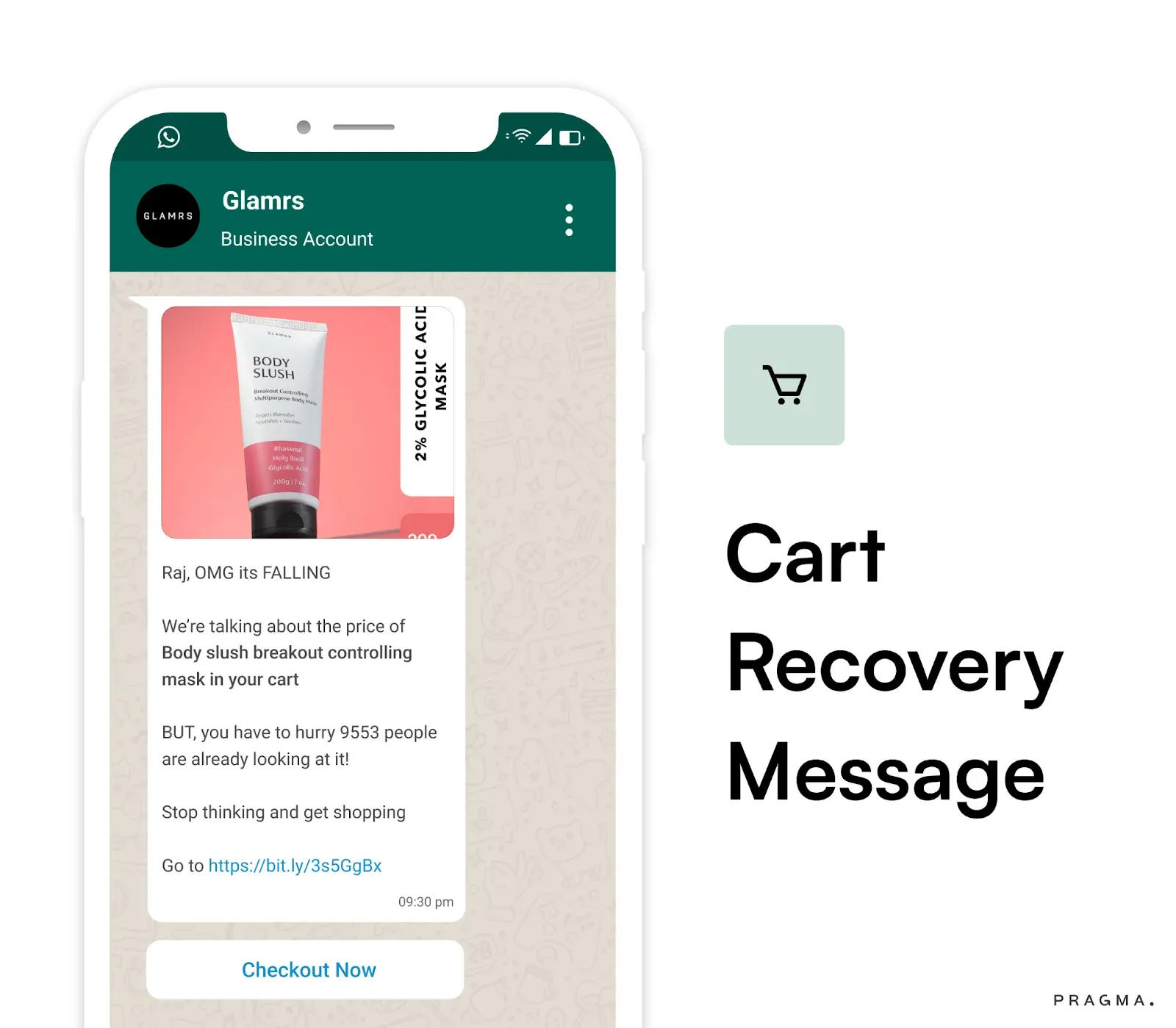
- Alerts and Reminders: You can also set up reminders for customers who haven't interacted with your business in a while. Imagine you're a fitness studio that offers classes. BotPenguin could send a reminder to clients who haven’t booked a class in over a month, offering them a special discount on their next session.
- Personalized Engagement: With BotPenguin, you can reengage based on how a customer interacts with your messages. For instance, if someone opened a message but didn’t respond, you could send a follow-up with additional incentives, increasing your chances of conversion.
Following these strategies leaves a long-lasting impression of your brand on the consumer’s mind. Constant personalized interactions make it easier to push prospects further down the sales funnel.
3. BOFU Stage (Bottom of the Funnel): Converting Conversations into Sales
At the bottom of the funnel, it's time to turn those engaged leads into paying customers. BotPenguin helps you convert by offering a seamless support system.
- Quick Replies and Support: BotPenguin’s chatbot can handle quick replies and automate responses for everyday inquiries, such as order status or product availability. This keeps the conversation flowing smoothly without overwhelming your customer service team.
- Lead Scoring to Prioritize Engagement: BotPenguin assigns lead scores using CRM integration, allowing your team to engage high-potential leads first. The chatbot can easily alert your sales team when a VIP client interacts, ensuring timely follow-ups.
- ChatGPT Integration for Smart Responses: BotPenguin integrates with ChatGPT, allowing the chatbot to pull live data from your database or website. This enables it to provide human-like responses. For instance, an online travel agency could use BotPenguin to offer personalized vacation packages based on the customer’s previous interactions, leading them closer to making a booking.
From seamless appointment booking to real-time responses, BotPenguin ensures every client interaction leads closer to closing the deal.
Suggested Reading:
How to Promote Your Products Using WhatsApp Affiliate Marketing
4. Retention Stage: Building Long-Term Customer Relationships
Finally, after making a sale, it's essential to focus on retention. WhatsApp marketing is an excellent tool for building long-term relationships with customers, and BotPenguin helps streamline this.
- Post-Purchase Follow-Ups: After a customer makes a purchase, you can send a follow-up message through BotPenguin to ask for feedback or suggest complementary products. For example, if someone buys a camera, BotPenguin could suggest lenses or accessories a few days later, increasing the chance of a repeat sale.
- Exclusive Offers and Loyalty Programs: You can also use WhatsApp to send exclusive offers or notify customers about loyalty programs. A coffee shop could use WhatsApp to alert loyal customers when they’re eligible for a free drink.
- Engaging Content: BotPenguin makes it easy to send content like how-to videos, tips, or tutorials related to your product. For example, a skincare brand could send video tutorials on how to use their products, keeping customers engaged even after the purchase.
By nurturing consistent engagement through personalized communication and exclusive offers, WhatsApp marketing through BotPenguin helps businesses foster lasting relationships, ensuring customers return again and again.
Real-Life Case Studies of WhatsApp Business Marketing
WhatsApp has become a powerful tool for businesses to connect with customers on a personal level. Many brands, as mentioned below, have successfully leveraged WhatsApp marketing to engage with potential and existing customers while streamlining customer service and boosting satisfaction.
1. Hellmann’s Mayonnaise – Personalized Recipe Campaign
Hellmann’s, a well-known mayonnaise brand, ran a successful WhatsApp marketing campaign in Brazil. They encouraged people to send photos of what was in their fridge. A professional chef would then use WhatsApp to suggest personalized recipes based on those ingredients. This real-time engagement made users feel valued, and the brand connected directly with customers in a fun and practical way.
- Outcome: The campaign reached over 13,000 participants in just one month, with a 99% customer satisfaction rate. Hellmann’s didn’t just promote a product—they created a personal experience through WhatsApp business marketing.
2. KLM Royal Dutch Airlines – Customer Service and Notifications
KLM Airlines integrated WhatsApp into their customer service strategy. By using WhatsApp Business API, the airline sent flight notifications, boarding passes, and customer support messages directly to passengers. This allowed travelers to stay informed and receive help quickly.
- Outcome: KLM saw an increase in customer satisfaction and engagement. Passengers appreciated the direct and timely communication, making WhatsApp a key part of the airline’s customer service approach. The airline handled over 10,000 WhatsApp messages weekly, proving the efficiency of WhatsApp for marketing in the travel industry.
3. Absolut Vodka – VIP Party Invitations
Absolut Vodka used WhatsApp to launch a contest in Argentina for VIP party invitations. To enter, customers had to convince a virtual bouncer via WhatsApp why they should be allowed to attend. This playful interaction made people actively engage with the brand in a way that felt fun and personal.
- Outcome: Over 1,000 customers participated, creating a buzz around the brand while building an exclusive atmosphere. Absolut successfully used WhatsApp for marketing to create excitement and engagement around their events, showing how interaction on this platform can foster brand loyalty.
4. BookMyShow – Automated Ticket Delivery
Indian ticket booking platform BookMyShow sends movie tickets directly to users through WhatsApp. They also use WhatsApp chatbot to provide showtimes, reminders, and customer support.
- Outcome: This automated process made it more convenient for users to access their tickets and receive updates, improving the customer experience. With WhatsApp business marketing, BookMyShow saw a rise in customer satisfaction as it streamlined communication.
Big brands have implemented diverse ways of using WhatsApp to engage customers, from personalizing interactions to automating services. Whether enhancing customer support or creating exclusive experiences, WhatsApp marketing can drive deeper connections and boost loyalty across industries.
Suggested Reading:
25 Attractive WhatsApp Business Introduction Messages
Best Practices for WhatsApp Business Marketing
To make the most of WhatsApp marketing, it's essential to follow best practices. These ensure that your messages are well-received, build trust, and result in meaningful engagement with your audience.
Get Customer Consent
Before you start sending messages, it’s important to get explicit opt-in permission from your customers. Offering an easy way for them to join your WhatsApp business marketing list ensures that you’re complying with privacy laws like GDPR. For example, a clothing brand could offer an incentive, such as a 10% discount, in exchange for customers opting in.
Segment Your Audience
One of the keys to successful WhatsApp marketing is personalization, and segmentation makes this easier. You can divide your audience based on behaviors, demographics, or purchase history. For example, a beauty brand can send skincare promotions to customers who previously bought similar products, ensuring messages are more relevant and engaging.
Short and Value-Driven Messages
In WhatsApp marketing, less is more. Long, drawn-out messages are likely to be ignored. Instead, keep your messages short, clear, and value-driven. For example, an electronics retailer might send a quick message about a limited-time sale with a direct link to the product. This approach gets the point across quickly and encourages action.
Leverage Multimedia
WhatsApp for marketing allows for rich media, including images, videos, and voice notes. Businesses should take advantage of these features to create engaging content. For example, a fitness center could send workout tips through videos, keeping customers engaged with useful content. Multimedia makes your message more visually appealing and interactive, which can increase engagement.
Automate Responses for Quick Customer Service
Providing quick and accurate responses is critical for customer satisfaction. Automation through tools like BotPenguin allows you to handle common inquiries or provide immediate support, even outside of business hours. For instance, a restaurant could use BotPenguin’s chatbot to confirm reservations, answer questions about the menu, and send out promotions, ensuring no lead is missed.
Use Two-Way Communication to Build Trust
Unlike other platforms, WhatsApp is designed for two-way communication, so it encourages responses. Invite your customers to ask questions, give feedback, or even place orders directly through WhatsApp. For instance, a local bakery might use WhatsApp to take custom cake orders and confirm delivery times. This personal approach helps build stronger relationships and fosters customer loyalty.
Respect Customer Privacy and Avoid Spamming
It’s crucial to respect your customers' privacy and avoid sending too many messages, as that can lead to them blocking or unsubscribing from your updates. Stick to sending value-driven content and limit the frequency of your messages. A retail store, for instance, might send weekly product updates or monthly newsletters, ensuring that they’re not overwhelming their audience.
Measure Your Success
Tracking your WhatsApp marketing campaigns is essential to understanding what works and what doesn’t. Tools like BotPenguin offer analytics to measure open rates, responses, and conversions. For example, a travel agency can monitor how many people responded to a promotional trip package and adjust future campaigns accordingly.
Analyzing your results ensures that you can refine your WhatsApp marketing strategy for better performance.
Beside following the best practices, it is crucial to constantly analyze and keep track of your customer’s behaviourial patterns and implement strategical updates to your overall WhatsApp marketing strategy.
Suggested Reading:
How to Send WhatsApp Reminder Messages like a Pro in 2025
Conclusion
In conclusion, WhatsApp marketing is a powerful tool for businesses to build personal connections, boost sales, and improve customer engagement.
By following best practices and learning from successful case studies, companies can harness WhatsApp to drive results at every stage of the funnel.
To streamline this process, platforms like BotPenguin offer an all-in-one solution. With its no-code setup, integration with CRMs, and AI capabilities, BotPenguin makes WhatsApp business marketing easy and efficient.
Whether you're looking to grow your contact list, send targeted messages, or provide automated customer support, BotPenguin supports your success every step of the way.
Frequently Asked Questions (FAQs)
What is WhatsApp marketing cost?
WhatsApp business app is free for all, but WhatsApp Business API involves cost. WhatsApp marketing costs vary based on message types, providers, and regions. Providers often charge extra for features such as automation or integrations, along with subscription fees
How Does WhatsApp Business Marketing Work?
Businesses use WhatsApp to connect with customers through product catalogs, automated messages, and customer support. The platform helps brands create personal connections and build loyalty with their audience
What Are the Benefits of Using WhatsApp for Marketing?
WhatsApp offers high engagement rates, multimedia sharing, and cost-effective communication. With features like automation and CRM integration, it ensures businesses stay connected with customers 24/7
What Types of Messages Work Best for Marketing on WhatsApp?
Short, value-driven messages with multimedia content perform well. Use videos, images, and personalized recommendations to engage customers effectively and drive action
How to Measure the Success of WhatsApp Marketing?
Use analytics tools and UTM tracking to monitor message open rates, responses, and conversions. Platforms like BotPenguin offer insights into campaign performance, helping refine your marketing strategy




